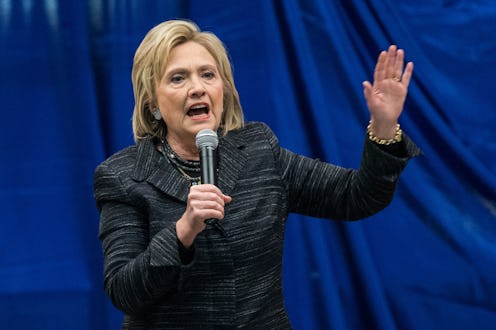News
How Much Did Goldman Sachs Donate To Hillary?
At Sunday night's Democratic debates, allegations flew about the stage. One major charge flung during the heated debates regards how much money Goldman Sachs donated to Hillary Clinton. According to the Center for Responsive Politics, Goldman Sachs funded $760,740 of Clinton's career, though the Center notes that the organizations themselves did not make these donations. Rather, the money is from the organizations' PACs — or political action committees — or individual members, employees, owners, and families of said PACs. In the case of Goldman Sachs, individual donors granted her $750,740, and the PACs provided her $10,000.
This isn't the first time Clinton has come under fire for donations from PACs of large companies and organizations. In fact, the information is so ubiquitous that memes and images on the very subject exist and are dispersed throughout forums and threads all over the Internet. Politifact discusses a popular one claiming that Clinton's top donors are banks and corporations, while Bernie Sanders' are labor unions. Whether labor unions are considered people or organizations is another discussion for another day, but most importantly, Politifact found many similarities between the truth of Clinton's donor history and the popular meme.
Clinton's top donors between 1999 and 2016 include Citigroup ($824,402), Goldman Sachs ($760,740), DLA Piper ($700,530), JPMorgan Chase ($696,456), Morgan Stanley ($636,564), EMILY’s List ($609,684), Time Warner ($501,831), Skadden Arps ($469,290), Lehman Brothers ($362,853), and Cablevision Systems ($336,613). Many of these are financial institutions whose names were mentioned during the 2008 financial crisis, which could make voters wary with good reason. Of course, Clinton has also collected donations from many small donors, who go wholly ignored in the aforementioned meme. Additionally, the data is less likely to record individual donations from union members, for instance, than from employers of companies, because companies take data precedence over unions.
It makes sense, with Clinton having served as a U.S. Senator from New York — especially during 9/11 — that she would have some relationship with the big banking and financial institutions of Wall Street. Whether this is something to admire or dislike is another story, though the connections are unquestionably helpful in raising awareness for one's presidential campaign. However, in Sunday's debate, Clinton stood strongly in defense of her own cause and the distaste she summons in the minds of billionaires:
I can tell you that the hedge fund billionaires who are running ads against me right now ... I'm the one they don't want.
Sanders and others may dispute the sincerity of her assertion, but ultimately, it is the voters who will make the final call come the caucuses and primaries in the approaching weeks.
